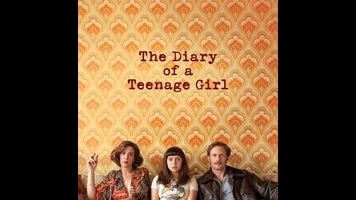The movie sees the relationship between Minnie and Monroe clearly, in the sense that Monroe is played by Skarsgård with the flaky haplessness of a Patrick Wilson character—someone who has not quite advocated for a bad decision, but is more than happy to go along with one. As such, he’s not a total manipulator: Minnie wants sex, both in general and with Monroe in particular, and the movie doesn’t wring its hands over that desire (though modern viewers may flinch at the implied lack of birth control used by anyone). For all of his loathsome behavior, Monroe isn’t really cast as a villain, and neither is Charlotte, despite being the kind of mother who brags to her daughter about being a “piece” when she was younger and says stuff like “I’m crashing, you guys” before stumbling off to bed.
Rather than mournful finger-pointing, Heller concentrates on Minnie’s attempts to find love, something she muses a lot about to her tape-recorded diary, which serves as intermittent narration for the film. (Diary entries provided the text for much of the source material, a book combining prose and comics passages.) She’s not driven by a desire for a boyfriend, per se—Monroe is the one who raises the idea that they might properly date when she reaches a legal age—but she often wonders whether anyone loves her, openly or in secret. Sex seems to be, at least in part, her way of investigating those feelings.
Minnie’s thoughts and feelings are sometimes annotated with animation based on her own drawings as an aspiring cartoonist: alt-comics-style sketches floating into the movie’s grainy, faded texture (digital cinematography doing a credible impression of film). Many of these hybridized images are striking; at the same time, they can’t compete with the pure effectiveness of Heller’s lead. Powley, a British twentysomething whose big, curious eyes and quavering, thoughtful voice allow for a seamless transition back to her teenage years, gives a remarkable performance, equally at home taking the lead in sex with an awkward teenage partner and participating in a courtship with Monroe based partly on kid-like roughhousing. The adults, even Monroe and Charlotte, feel secondary to the formation of her voice, as they should. But those performances work too, with Wiig dodging the cartoonishness that lurks around every corner for her funny-sad character.
For a movie about such fraught topics, sometimes rendered with admirable and non-squeamish explicitness, Diary often eschews melodrama; when the plot turns, it does so abruptly, providing a credible simulation of real-life tumult. Toward the end, though, the period gloss on sex and drugs grows repetitive. The movie never reconciles the suddenness of Minnie’s uncomfortable hook-ups and bad trips with how obligatory this material plays, especially when it’s essentially written off as a learning experience. Heller sometimes strains for the universal where the personal would work just fine, and probably better. The movie’s dedication to girls everywhere is unnecessary; it already feels so specific and true without it.


 Keep scrolling for more great stories from A.V. Club.
Keep scrolling for more great stories from A.V. Club.